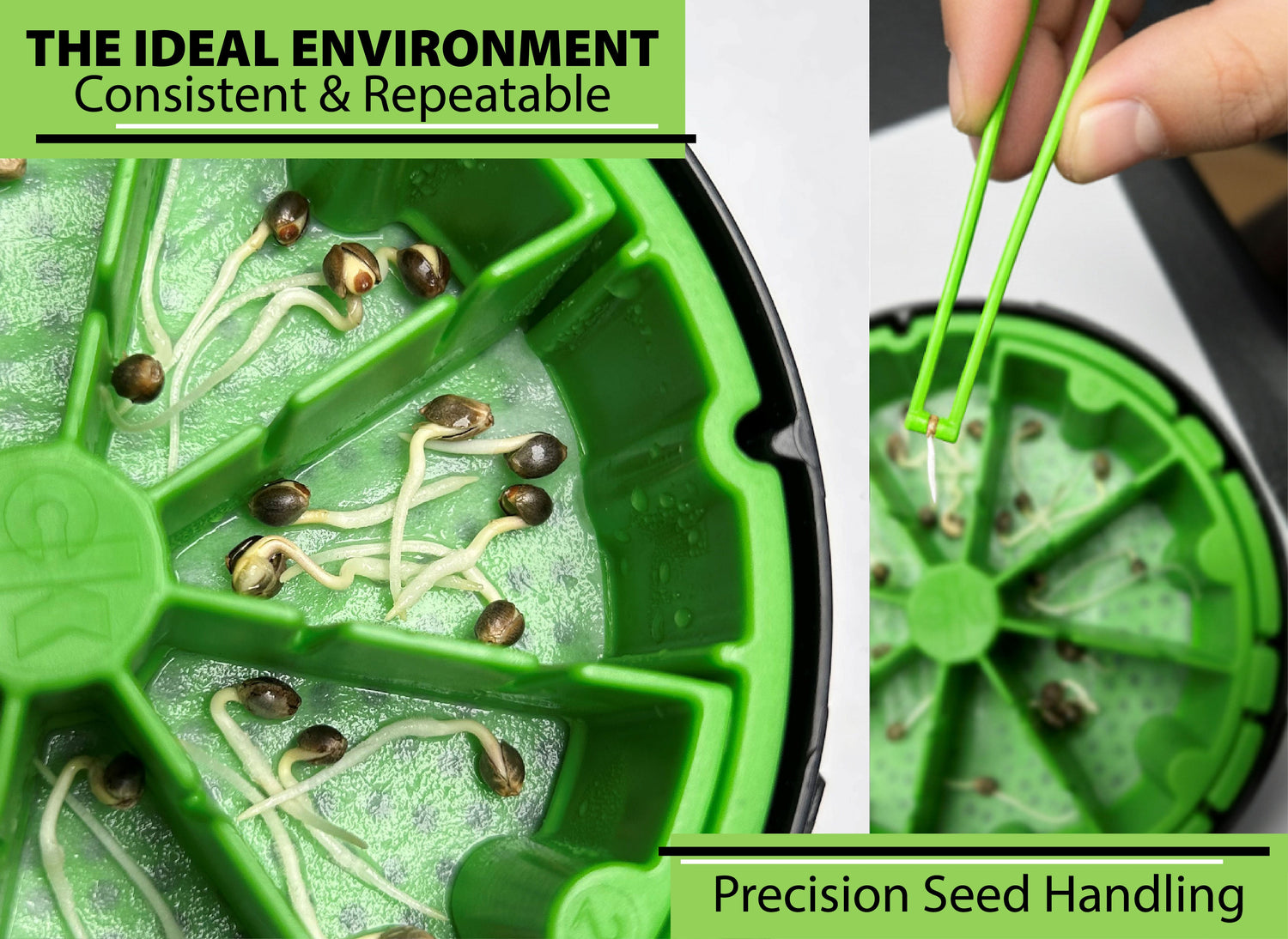Controlled Microclimate via Natural Convection
The FAR infrared heat pad delivers stable, bottom-up thermal energy. Unlike standard heat mats, FAR pads are more accurate and reliable, maintaining tighter tolerances over long periods. The sealed lid remains cooler than the base, creating a temperature differential that drives natural convection inside the canister. This balances humidity and oxygen exchange, forming a stable microclimate that mimics natural soil-air conditions far more effectively than static methods.
Partitioned Seed Management with Filter Integration
The system uses a single lab-grade filter paper placed on the strainer. The partition then snaps into the strainer, holding the filter securely in place. This design ensures consistent moisture distribution across all cells. With up to 8 separate partitions, multiple seed varieties can be germinated simultaneously in a single controlled environment.
Radicle Protection & Hygienic Transfer
The HUGGERS® precision tweezers feature a cupped tip that cradles radicles without crushing them, and a dibber end for safe transfer into soil, plugs, or hydro media. This reduces transplant shock and preserves delicate root tissue.
Organized Tracking & Cataloging
The partition chart system allows growers to catalog seed variety, sex, type, and quantity. It also records the date and time of germination start, making the process highly organized and traceable. This level of tracking is especially valuable for breeders, labs, or commercial growers handling multiple varieties or research trials.
Repeatable, Low-Variance Outcomes
By standardizing water, oxygen, and temperature conditions, the KAN® System minimizes variance in germination rates and synchrony. This leads to reproducible outcomes across batches, conserving both seed stock and grower time.
Sustainability & Efficiency
-
Durable, reusable polypropylene canister components
-
Low-energy FAR infrared heating pad
-
Reduces dependency on single-use plastics and non-biodegradable substrates
The Clear Choice
Traditional methods rely on guesswork and uncontrolled variables. The CannaKAN® KAN® System by CKAN™ integrates thermal dynamics, filter-based uniformity, partitioned organization, and precision handling into one compact solution. For anyone working with rare, expensive, or high-volume seed lots, the KAN® System is a scientifically engineered tool designed for maximum germination success.
Comparison: Traditional vs. KAN® System
| Aspect | Traditional Methods | CannaKAN® KAN® System |
|---|---|---|
| Temperature Control | Inconsistent; depends on room environment | FAR infrared pad maintains stable temperatures with natural convection |
| Oxygen Availability | Paper towels/cotton pads restrict flow; water cups cause hypoxia | Balanced air exchange inside sealed canister |
| Moisture Regulation | Towels dry out quickly; soil/rockwool retain unevenly | Single lab-grade filter paper ensures uniform moisture distribution |
| Radicle Protection | Roots tangle in towels or soil; easily damaged during transfer | Roots won't grow into lab filter pads & HUGGERS® tweezers cradle radicles and allow sterile transplant |
| Organization | Easy to lose track of varieties, dates, or weak seedlings | Numbered partition holds up to 8 varieties; partition chart catalogs variety, sex, type, quantity, and start time/date |
| Contamination Risk | High: stagnant water, mold-prone towels, or soil microbes | Controlled, closed system with reduced microbial exposure |
| Environmental Impact | Disposable towels, cotton pads, rockwool, and single-use plastic create waste | Reusable canister, low-energy FAR pad, reduced single-use plastics |
| Reproducibility | High variance between attempts | Low-variance, repeatable outcomes suitable for labs and growers |
Conclusion
In germination, precision and repeatability matter. Outdated methods introduce unnecessary risks. The KAN® System ensures seeds always receive what they need most – Water · Oxygen · Warmth – in a controlled, organized, and eco-conscious way.



0 comments